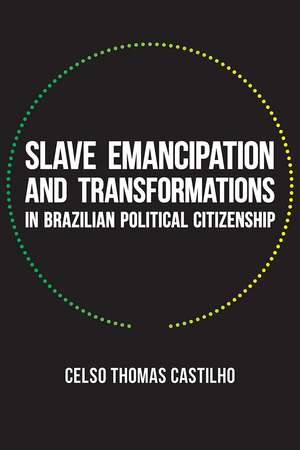Slave Emancipation and Transformations in Brazilian Political Citizenship: Pitt Latin American Series
Autor Celso Thomas Castilhoen Limba Engleză Paperback – 20 iun 2016
Winner, 2018 AHA Bolton Prize (best book on Latin American History)
Winner, 2018 AHA/CLAH Dean Prize (best book on Brazilian History)
Celso Thomas Castilho offers original perspectives on the political upheaval surrounding the process of slave emancipation in postcolonial Brazil. He shows how the abolition debates in Pernambuco transformed the practices of political citizenship and marked the first instance of a mass national political mobilization. In addition, he presents new findings on the scope and scale of the opposing abolitionist and sugar planters’ mobilizations in the Brazilian northeast. The book highlights the extensive interactions between enslaved and free people in the construction of abolitionism, and reveals how Brazil’s first social movement reinvented discourses about race and nation, leading to the passage of the abolition law in 1888. It also documents the previously ignored counter-mobilizations led by the landed elite, who saw the rise of abolitionism as a political contestation and threat to their livelihood.
Overall, this study illuminates how disputes over control of emancipation also entailed disputes over the boundaries of the political arena and connects the history of abolition to the history of Brazilian democracy. It offers fresh perspectives on Brazilian political history and on Brazil’s place within comparative discussions on slavery and emancipation.
Winner, 2018 AHA/CLAH Dean Prize (best book on Brazilian History)
Celso Thomas Castilho offers original perspectives on the political upheaval surrounding the process of slave emancipation in postcolonial Brazil. He shows how the abolition debates in Pernambuco transformed the practices of political citizenship and marked the first instance of a mass national political mobilization. In addition, he presents new findings on the scope and scale of the opposing abolitionist and sugar planters’ mobilizations in the Brazilian northeast. The book highlights the extensive interactions between enslaved and free people in the construction of abolitionism, and reveals how Brazil’s first social movement reinvented discourses about race and nation, leading to the passage of the abolition law in 1888. It also documents the previously ignored counter-mobilizations led by the landed elite, who saw the rise of abolitionism as a political contestation and threat to their livelihood.
Overall, this study illuminates how disputes over control of emancipation also entailed disputes over the boundaries of the political arena and connects the history of abolition to the history of Brazilian democracy. It offers fresh perspectives on Brazilian political history and on Brazil’s place within comparative discussions on slavery and emancipation.
Din seria Pitt Latin American Series
-
 Preț: 429.67 lei
Preț: 429.67 lei -
 Preț: 450.40 lei
Preț: 450.40 lei -
 Preț: 355.58 lei
Preț: 355.58 lei -
 Preț: 431.62 lei
Preț: 431.62 lei -
 Preț: 392.66 lei
Preț: 392.66 lei -
 Preț: 388.79 lei
Preț: 388.79 lei -
 Preț: 428.14 lei
Preț: 428.14 lei -
 Preț: 362.33 lei
Preț: 362.33 lei -
 Preț: 416.05 lei
Preț: 416.05 lei -
 Preț: 393.58 lei
Preț: 393.58 lei -
 Preț: 330.31 lei
Preț: 330.31 lei -
 Preț: 394.57 lei
Preț: 394.57 lei -
 Preț: 389.76 lei
Preț: 389.76 lei -
 Preț: 334.31 lei
Preț: 334.31 lei -
 Preț: 388.79 lei
Preț: 388.79 lei -
 Preț: 396.85 lei
Preț: 396.85 lei -
 Preț: 350.79 lei
Preț: 350.79 lei - 17%
 Preț: 445.11 lei
Preț: 445.11 lei -
 Preț: 388.03 lei
Preț: 388.03 lei -
 Preț: 365.05 lei
Preț: 365.05 lei -
 Preț: 457.11 lei
Preț: 457.11 lei -
 Preț: 471.15 lei
Preț: 471.15 lei - 17%
 Preț: 384.07 lei
Preț: 384.07 lei -
 Preț: 428.14 lei
Preț: 428.14 lei -
 Preț: 389.17 lei
Preț: 389.17 lei -
 Preț: 394.65 lei
Preț: 394.65 lei -
 Preț: 429.89 lei
Preț: 429.89 lei -
 Preț: 392.66 lei
Preț: 392.66 lei -
 Preț: 424.88 lei
Preț: 424.88 lei -
 Preț: 389.38 lei
Preț: 389.38 lei -
 Preț: 432.57 lei
Preț: 432.57 lei -
 Preț: 419.06 lei
Preț: 419.06 lei -
 Preț: 393.58 lei
Preț: 393.58 lei -
 Preț: 354.23 lei
Preț: 354.23 lei -
 Preț: 458.07 lei
Preț: 458.07 lei -
 Preț: 389.76 lei
Preț: 389.76 lei -
 Preț: 363.26 lei
Preț: 363.26 lei -
 Preț: 502.82 lei
Preț: 502.82 lei -
 Preț: 423.91 lei
Preț: 423.91 lei -
 Preț: 395.54 lei
Preț: 395.54 lei -
 Preț: 153.64 lei
Preț: 153.64 lei -
 Preț: 351.72 lei
Preț: 351.72 lei -
 Preț: 383.01 lei
Preț: 383.01 lei -
 Preț: 393.58 lei
Preț: 393.58 lei -
 Preț: 351.55 lei
Preț: 351.55 lei -
 Preț: 351.72 lei
Preț: 351.72 lei -
 Preț: 389.76 lei
Preț: 389.76 lei -
 Preț: 331.86 lei
Preț: 331.86 lei -
 Preț: 358.46 lei
Preț: 358.46 lei -
 Preț: 362.95 lei
Preț: 362.95 lei
Preț: 387.82 lei
Nou
Puncte Express: 582
Preț estimativ în valută:
74.21€ • 78.04$ • 61.32£
74.21€ • 78.04$ • 61.32£
Carte tipărită la comandă
Livrare economică 17 aprilie-01 mai
Preluare comenzi: 021 569.72.76
Specificații
ISBN-13: 9780822964124
ISBN-10: 0822964120
Pagini: 280
Ilustrații: 4 b&w illustrations
Dimensiuni: 152 x 229 x 18 mm
Greutate: 0.41 kg
Ediția:1
Editura: University of Pittsburgh Press
Colecția University of Pittsburgh Press
Seria Pitt Latin American Series
ISBN-10: 0822964120
Pagini: 280
Ilustrații: 4 b&w illustrations
Dimensiuni: 152 x 229 x 18 mm
Greutate: 0.41 kg
Ediția:1
Editura: University of Pittsburgh Press
Colecția University of Pittsburgh Press
Seria Pitt Latin American Series
Recenzii
“Castilho’s focus on abolitionism and citizenship is new and valuable. He reveals a great deal about the understudied role of a part of the country that is often portrayed incorrectly as passive, as well as helping us understand the origins of ‘urban radicalism’ in the country as a whole.”
—Andrew J. Kirkendall, Texas A&M University
—Andrew J. Kirkendall, Texas A&M University
“In compelling fashion, this book tells the story of slavery’s end in a major Brazilian sugar-producing province and demonstrates that popular political engagement in the abolition movement profoundly challenged the limits of citizenship. Celso Castilho casts new light on the development of participatory politics in imperial Brazil and forces us to rethink the origins of democracy in the country.”
—Hendrik Kraay, University of Calgary
—Hendrik Kraay, University of Calgary
Notă biografică
Celso Thomas Castilho is assistant professor of history at Vanderbilt University.











